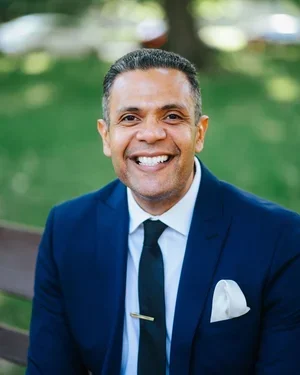Bennington Stories: Dr. Alfredo Medina, Jr.
Dr. Alfredo Medina, Jr. is Bennington College's Vice President for Diversity, Equity & Inclusion.

Introducing Bennington Stories, a series of first-person messages that share voices from throughout the unique and multifaceted Bennington community.
The Importance Of A Difficult Conversation
I’ve spent most of my life in the American Northeast. I’m a born New Yorker, raised in the predominantly Dominican neighborhood of Washington Heights.
I have established multiple identities: I am Dominican, with African and Indigenous ancestry in my family tree. I am also a New Yorker. I am also Latino. And so on.
As a young man, I struggled to grasp how I would fit into the world. I was constantly asking myself if I was brown or Black enough. I gravitated towards storytelling at an early age and have since made it my life’s work to amplify the voices of people, like myself, who are often marginalized and have had to navigate a multitude of ethnic/sexual/religious identities in predominately white spaces. I committed myself to that ethos, eventually acquiring a Ph.D. with a focus on college student persistence and Latinx identity.
In America, we are so often told that we are just one thing. Identity should never be perceived as a monolith, as it comes with its own set of tricky assumptions.
For example: as I grew up, it was assumed you are either man or a woman. Now, we understand that gender identity can be nonbinary or non-conforming. Growing up Latino, white folks sometimes assumed my family was religious whereas I have known other Latinos who are either agonistic or outright atheists.
Nowadays, we have the language and historical context necessary to unpack and address these identity assumptions. Diversity, equity, and inclusion frameworks and lenses help us do exactly that.
I have always had an unwavering love for the liberal arts, having worked in liberal arts institutions for over 15 years and sent three of my children to liberal arts colleges. Liberal arts allow us to consider views that might challenge the ones we hold. It affords you the opportunity to challenge ahistorical narratives that were once thought of as truth. It has given rise to Critical Race Theory (CRT) to debunk narratives that diminish and erase BIPOC experiences.
For me, Bennington embodies all of that and more. It’s an institution that embodies self-direction and academic freedom. Here, diversity isn’t a buzzword. It’s an ethos.
For one: Bennington is, by far, one of the most beautiful, prideful queer campuses I’ve ever had the pleasure of working at. Collectively, our student body hails from more than 45 different countries. Do you have any idea how many dialects are spoken across our campus, even over the course of just a day? You can find students speaking Hindi, Urdu, Spanish, French, or Arabic at any given time. We say “yes” to social justice and antiracism, and “no thanks” to systemic racism while challenging heteronormative structures and ideas.
Our Associate Director of DEI, Xiomara Giordano, takes care of much of our student-facing obligations. Sometimes, that can mean accommodating students of different faiths who want to make space on campus to pray together. We have observant Muslim students who need space to pray daily. During Ramadan, we work with the Muslim Student Association to designate a place where Muslim students can break fast. We want all of our students to have that special connection to home here, at Bennington. Rather than tell students what we think their home should feel like, we help bring the feeling of home to them.
This past spring, we sponsored a Passover Seder for Bennington’s Jewish students. Our Jewish students made sure to let us know that they felt seen. I also witnessed students from all walks of life attend Seders and break fast for Ramadan.
I am constantly asking myself what we are doing to challenge systemic racism in our curriculum. Sometimes it’s as simple as looking at a policy that was crafted decades ago and realizing that it may not apply in today’s campus climate. It’s looking at how we use language, both inside and outside, the classroom. It’s about culturally responsive teaching and pedagogy. It’s about allowing students to see their identities reflected in courses.
There is a diversity at Bennington that is unlike any college I’ve ever been associated with. Of course, I grew up in the “colorblind” era. I’ve been told, in the past, that people don’t see me for my color, but for my “character.” Well, my rich, brown melanin is a big part of my character. It’s honoring my ancestors who were involuntarily shipped and sold in the Caribbean Islands and faced genocide. When you erase my color, you’re erasing me.
My job isn’t supposed to be easy. It involves difficult, sometimes messy, and clumsy conversations. Antiracist work is about liberation, and liberation is rarely polite or “nice.” By the day, our world is becoming more Black, browner, more queer, more Trans. We are moving away from the stifling heteronormativity of past generations and towards a more diverse and inclusive future.
These conversations, however, initially uncomfortable as they might be, are critical and valuable to have. Bennington allows me to help facilitate those conversations, in a manner that will hopefully get us all closer to where we need to be. Where we would like to be.
Alfredo Medina, Jr., Ph.D.
Vice President for Diversity, Equity and Inclusion and College Diversity Officer
Interim Vice President of Institutional Advancement